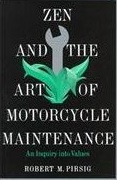What makes a story great, or even good? For this discussion I’ll concentrate on short stories, my main medium, but the principles apply to all fiction. Fair warning: I’ll explore the topic to the best of my ability, but if I was an expert on writing great short stories, I would be better known.
Philosophers since at least the ancient Greeks have puzzled about what makes one thing better or of greater value than another. Is it really all subjective, in the mind of each individual reader, or are there some objective aspects on which we can all agree? Further, what is meant by ‘great?’ Do we measure great stories by sales, by the number of favorable reviews, or by how the story stands the test of time?
 For an interesting romp through the fields of quality, goodness, and value (in general, not specifically as related to stories) read Zen and the Art of Motorcycle Maintenance by Robert Pirsig.
For an interesting romp through the fields of quality, goodness, and value (in general, not specifically as related to stories) read Zen and the Art of Motorcycle Maintenance by Robert Pirsig.
Of course, people differ in the stories they like, and a given reader may change her own tastes over time. So there must be a subjective component to any definition of a good story. I touched on this in a previous blog entry.
Still, perhaps we can agree on a few elements that should be present in a good story. Not every element need be present, and excellence in some of them can make up for mediocrity in others. Further, as you’ll see, these aren’t exactly objective elements, so people could disagree about whether they are present or absent in any given story. Here are my ten elements, expressed in one long sentence:
- A good story deals with one or more aspects of the human condition and starts with
- an attention-grabbing hook that introduces
- a compelling protagonist, with whom the reader can identify, who is
- dealing with a difficult problem, a problem
- with some relevance to the reader’s own life
- in a vivid setting that puts the reader right there while the protagonist
- encounters more difficult obstacles along the way
- with enough tension and suspense to keep readers reading
- and with the protagonist resolving the problem in the end in a satisfying, logical way, with bonus points if the protagonist learns something, and more bonus points if the reader can’t guess the ending early
- with the whole story told in strong, clear language that produces an emotional reaction in the reader.
As it turns out, it’s easier to write down that list than it is to write a story that hits most of those marks. Thinking back over the best short stories you’ve read, are there common elements they share? Have I left out any elements in my list? As writers, we ought to be striving for greatness as we tell our tales, so it helps to know what separates good or great stories from the rest. I welcome your thoughts, which you can provide by clicking “leave a comment” below, whether or not you agree with–
Poseidon’s Scribe
